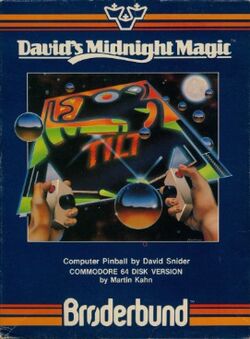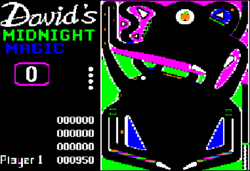Software:David's Midnight Magic
| David's Midnight Magic | |
|---|---|
 | |
| Developer(s) | Broderbund |
| Publisher(s) | Broderbund Ariolasoft (EU) Atari Corporation (cartridge) |
| Programmer(s) | David Snider[1] Martin Kahn (C64)[2] |
| Platform(s) | Apple II, Atari 8-bit, Commodore 64 |
| Release | 1982: Apple, Atari 8-bit 1983: C64[2] 1987: Atari 8-bit cartridge |
| Genre(s) | Pinball |
| Mode(s) | Single-player, 2-4 players alternating |
David's Midnight Magic is a pinball simulation video game written by David Snider for the Apple II and published by Broderbund in 1982.[1] The game was published in Europe by Ariolasoft. A port to the Atari 8-bit family was released the same year, then the Commodore 64 in 1983. In 1987 Atari Corporation published a cartridge in the styling of the then-new Atari XEGS.
Gameplay
David's Midnight Magic is closely modeled after the popular real-life pinball table Black Knight, released by Williams in 1980.[citation needed]
Reception
Softline stated that David's Midnight Magic "ratifies Bill Budge's extraordinary program as a programming tour de force", as it was only equal to Budge's Raster Blaster despite being released nine months later. The magazine concluded that "the fact that [David is] second should not dull the glitter of this effort".[3] Computer Gaming World stated that Midnight Magic was a better game than Raster Blaster, but lamented the requirement of removing write protection from the floppy, thus voiding the warranty, in order to save high scores.[4] The Commodore 64 Home Companion called the game "extraordinarily realistic ... complete with all the features that make pinball so seductive".[5]
David's Midnight Magic won "Computer Game of the Year" at the 4th annual Arkie Awards, where judges described it as "a program that is both an exciting video game and a fairly faithful evocation of pinball mystique".[6]:32
Legacy
Atari Corporation released a pinball game called Midnight Magic for the Atari 2600 that plays differently from the similarly named David's Midnight Magic.
Doug Carlston of Broderbund said in 1983 that Snider earned "somewhere in the six figures" in royalties from David's Midnight Magic.[7] Snider's brother Eric later used his first name in the title of Eric's Ultimate Solitaire.[citation needed]
In 2005, a Visual Pinball recreation of David's Midnight Magic was created called David's Midnight Magic 2005 which is rendered with modern 3D graphics.
See also
- Raster Blaster, 1981 Apple II pinball game
References
- ↑ 1.0 1.1 Hague, James. "The Giant List of Classic Game Programmers". https://dadgum.com/giantlist/.
- ↑ 2.0 2.1 David's Midnight Magic at Lemon 64
- ↑ Tommervik, Al (January 1982). "David's Midnight Magic". Softline: pp. 32. http://www.cgwmuseum.org/galleries/index.php?year=1982&pub=6&id=3. Retrieved 13 July 2014.
- ↑ Greenlaw, Stanley (March–April 1982), "Pinball Mania", Computer Gaming World: 35, 38
- ↑ "Broderbund Software". The Commodore 64 Home Companion. 1984. pp. 166–167. https://archive.org/stream/The_Commodore_64_Home_Companion#page/n167/mode/2up.
- ↑ Kunkel, Bill; Katz, Arnie (March 1983). "Arcade Alley: The Best Computer Games". Video (Reese Communications) 6 (12): 32–33. ISSN 0147-8907.
- ↑ Barry, David (October 1983). "Profiles: The Carlston Trio". Antic. https://www.atarimagazines.com/v2n7/CarlstonTrio.html. Retrieved 2021-07-01.
External links
 |


